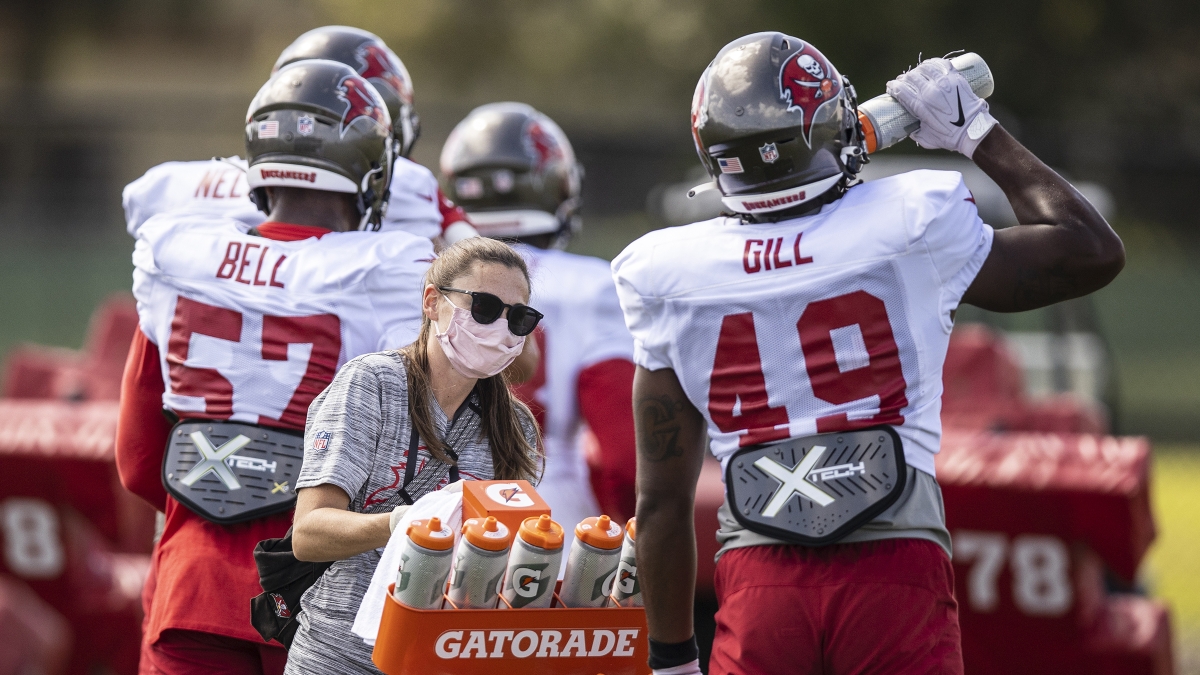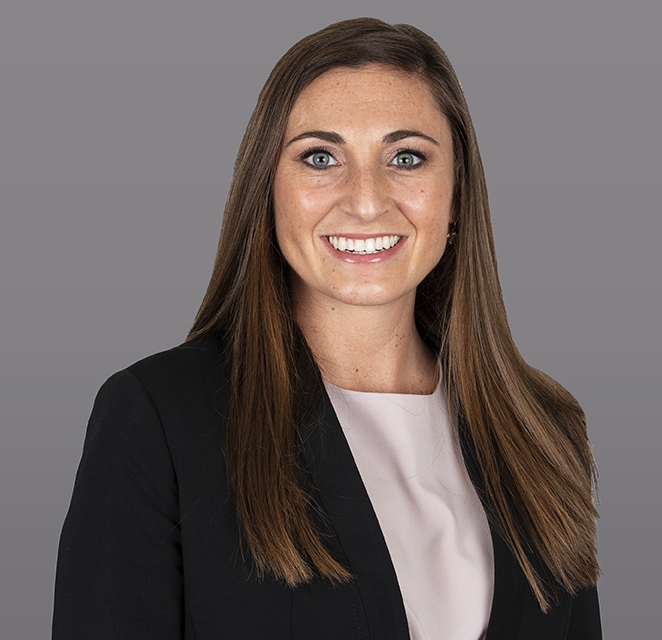For many, Super Bowl Sunday is a junk food junket, a day filled with chips, chicken wings and extravagant spreads — but not for Arizona State University alumna Stephanie Kolloff O’Neill.
On her Super Bowl Sunday this February, Kolloff O’Neill spent the day on the sideline at Tampa Bay’s Raymond James Stadium, where she kept the players of the Tampa Bay Buccaneers team fueled up with wholesome snacks and sports drinks throughout the game as they dominated the Kansas City Chiefs with a 31-9 win in Super Bowl LV.
Kolloff O’Neill is director of performance nutrition for the Buccaneers and the first female, full-time sports dietitian to work on the sideline with an NFL team at a Super Bowl.
She is the one in charge of nutrition for these elite players during both the on- and offseasons. While the season is on, Kolloff O’Neill starts every morning having breakfast with the team. Then it’s meetings, followed by meal planning, and then on to football practice, where she supervises player hydration and strategizes about nutritional improvements to help get them through the grind.
Her work requires long hours with few days off, and it doesn’t stop once the season ends.
“Offseason, we focus on players recovering their bodies,” she said. “The team just completed over six straight months of playing football, so rest and recovery are an immediate focus, and some surgeries may also be needed. To complement nutrition in these phases, I work individually with players to boost anti-inflammatory foods and micronutrients in their diets.”
It’s a dream job for this certified specialist in sports dietetics who started her journey at ASU’s College of Health Solutions, earning concurrent bachelor’s degrees in nutrition and exercise and wellness in 2013. Her time at ASU taught her how to push herself. In addition to her coursework for two majors, she also held a job, had leadership roles in the Student Nutrition Council and the Arizona Academy of Nutrition and Dietetics and always said "yes" to volunteer opportunities, including an internship with the first full-time sports dietitian at ASU Sun Devil Athletics.
After earning her master's degree from Auburn University in 2016, she was an assistant sports dietitian working with Auburn's baseball, football and soccer teams before becoming the football performance dietitian for Texas A&M in 2018. From there it was on to the bigger stage of the NFL when she joined the Buccaneers’ staff in 2019.
She recently spoke with the College of Health Solutions about her work and its impact on the health of both the NFL players she helps and the community at large.
Stephanie Kolloff O'Neill
Question: How does your role give you a forum for promoting sound nutrition overall?
Answer: I educate the athletes I work with on how all foods fit into a balanced fueling plan, and that consistency and timing are the keys to performance. Depending on the day of the week in relation to our game, we’re designing our menus and educating the team on these principles. At our team facility, we create an environment for there to be easy choices that they can also easily replicate in the evenings at home and in the offseason. Beyond the facility, the Buccaneers and (team owners) the Glazer familyBrothers Bryan Glazer Joel Glazer, Edward Glazer and sister Darcie inherited ownership of the team after their father Malcolm’s death in 2014. The Glazer family has owned the Bucs since 1995. have incredible social justice platforms that allow us to improve food security, health and wellness in the local Tampa communities.
Q: In what ways are you contributing to health solutions in your profession?
A: I am always looking to improve sustainability within our kitchen and meals, whether that’s through increasing the use of locally sourced ingredients, reducing food waste or including plant-based protein sources and menu items. When we travel on the road, we work with local food-rescue organizations to provide meals and leftover hydration products for those in need within that community.
Q: How are you improving health outcomes now for those you serve?
A: Working in a direct role with our athletes, it’s wonderful to see how a change in nutrition habits can directly impact a player’s training and performance in a game. For example, I’ve seen how improving pre-game fueling leaves players finishing the game saying they felt better energy levels during the game, or how improving hydration habits during practice can reduce the risk of an injury or improve on-field decision-making and reaction time.
From an overall health standpoint, the average player can age out of the NFL when they’re around 27, so setting them up with the knowledge and tools to fuel a healthy life after their playing career ends is an important aspect of my job. Obesity and metabolic disease are, unfortunately, not uncommon struggles for former players, so by working on strong nutrition habits around play, I can educate players on how those same habits can be used to fuel a healthy lifestyle as they transition to their lives after football.
Q: What advice do you have for those wanting to make an impact on the world of health?
A: Health doesn’t always come easily to individuals, athletes included. Keep your messages simple and build from there, so an easy choice made can become an easy habit embraced. Our textbooks teach us a lot of black and white — one right way to do things — but always keep an open mind and be flexible because each person is different from the next.
Top photo courtesy Stephanie Kolloff O’Neill and the Tampa Bay Buccaneers’ digital team
More Health and medicine

The science of sibling dynamics: Why we fight, how we relate and why it matters
We have Mother’s Day, Father’s Day and even Grandparents’ Day. But siblings? Usually they get a hand-me-down sweatshirt and, with any luck, a lifetime of inside jokes.But actually, there is a…

New study seeks to combat national kidney shortage, improve availability for organ transplants
Chronic kidney disease affects one in seven adults in the United States. For two in 1,000 Americans, this disease will advance to kidney failure.End-stage renal failure has two primary…

New initiative aims to make nursing degrees more accessible
Isabella Koklys is graduating in December, so she won’t be one of the students using the Edson College of Nursing and Health Innovation's mobile simulation unit that was launched Wednesday at Arizona…



